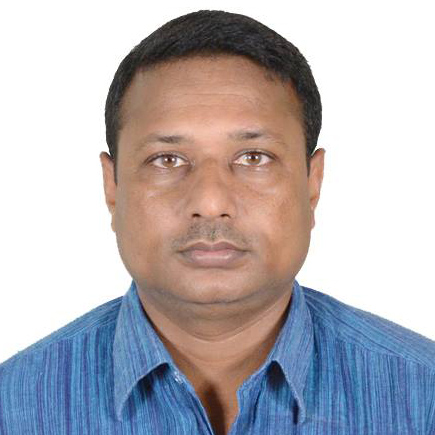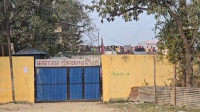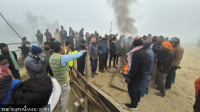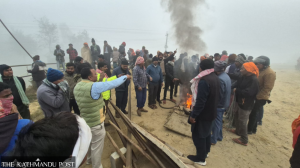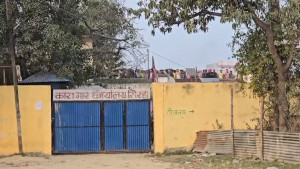Madhesh Province
Province 2 districts vulnerable to Covid-19 resurgence but preparedness sorely lacking
Border crossings in Parsa and Bara have been witnessing a rise in the number of people returning from India lately.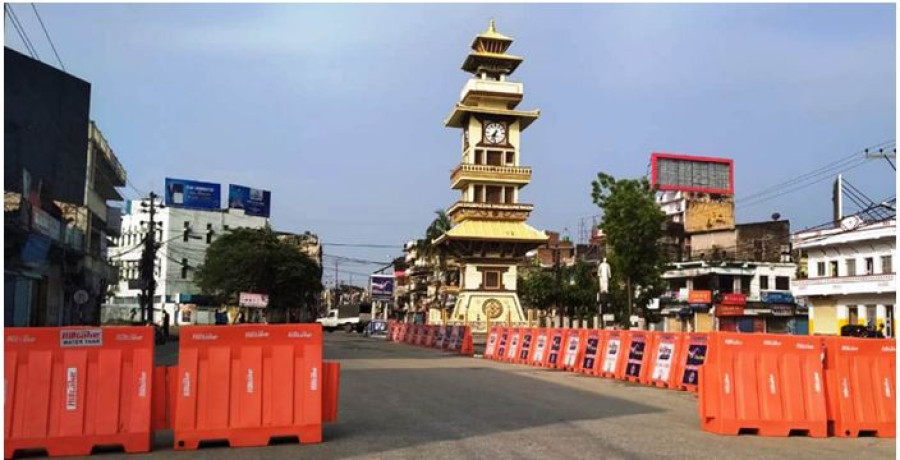
Shankar Acharya & Laxmi Sah
All eight districts in Province 2 share borders with India but Parsa and Bara are seeing the largest cross-border movement of people than any other districts.
With India struggling with the second wave of Covid-19 pandemic, which is said to peak in the next few weeks, health authorities are worried about the rise in the number of Covid-19 cases in border areas.
The authorities, particularly in the border areas, are sorely underprepared to handle a surge in infection.
Since the beginning of this month, the number of Covid-19 patients has increased in Parsa. According to the data of Narayani Hospital in Birgunj Metropolitan City, the district headquarters of Parsa, 24 individuals tested positive for the disease in the last two days alone.
The hospital, which was designated as a Covid-19 treatment hospital at the height of the pandemic last year, is not fully equipped to treat the coronavirus patients.
Other hospitals in Birgunj also lack preparations and resources to handle Covid-19 cases. This has left Parsa highly vulnerable.
Dr Saroj Roshan Das, information officer of Narayani Hospital, said currently four Covid-19 patients are receiving treatment in the emergency unit of the hospital.
“The hospital is not in a position to admit more Covid-19 patients at the moment,” said Das.
The hospital is setting up an intensive care unit and a high dependency unit for the treatment of Covid-19 patients. The two units are expected to be completed shortly.
Das said the Ministry of Health and Population has directed every hospital in the district to separate 30 percent of their beds for the treatment of Covid-19 patients.
Fifty-one individuals died of Covid-19 in Parsa in the past one year, according to the data of the Provincial Health Directorate. Similarly, out of 30,000 swab samples collected for testing, the results of over 3,000 samples came back positive for the coronavirus infection.
A large number of Covid-19 patients had to stay in home isolation last year due to bed shortages, and health officials fear the situation could get much worse this time around.
“Covid-19 cases could explode if the border points are not monitored strictly. The situation can get worse in Birgunj, ” said Dr Udayanarayan Singh, head of the Emergency Unit in Narayani Hospital.
Singh suspects that the current active Covid-19 cases in Parsa district could be much higher given the low test numbers.
“The rate of swab collection and testing is low. As a result, very few cases are being reported these days,” said Singh. “The number of cases in Parsa will be much higher if swab collection and testing processes are expedited.”
Meanwhile, Bara district has also begun seeing an uptick in the number of Covid-19 cases.
According to the District Health Office in Bara, 19 individuals tested positive in the last three days, prompting local governments to reintroduce tracing, testing and treatment of Covid-19 patients.
Both Parsa and Bara districts share an open border with East Champaran in Bihar, India.
Kalaiya Sub-Metropolitan City, district headquarters of Bara, is struggling in its effort to contain Covid-19 infections. The only polymerase chain reaction (PCR) machine which was purchased five months ago to conduct Covid-19 testing has not been put to use because the local government has yet to secure approval from the National Public Health Laboratory.
Kalaiya and other local units in Bara had invested Rs 10 million for the machine and other additional accessories. According to the sub metropolis, the machine was purchased at a cost of Rs 8.5 million.
The machine that can test 96 swab samples at a time was installed at Kalaiya Hospital at a cost of Rs 10 million.
“A lot of money was spent in procuring and installing the machine but it is yet to be operated. This has deprived the citizens of their right to healthcare,” said Upendra Prasad Yadav, mayor of Mahagadhimai Municipality.
The machine was purchased without permission from the National Public Health Laboratory. The sub metropolis had also appointed 11 employees including technicians to operate the machine.
“The federal and the provincial government have not given us permission to operate the machine. This is the main reason behind the machine remaining unused,” said Rajeshraj Yadav, mayor of Kalaiya Sub Metropolis..
According to him, technical employees, who were appointed to operate the machine, have also been released. “We have frequented the Ministry of Social Development and Provincial Health Directorate seeking permission to run the machine. But they said we have to seek permission to run the machine from the centre,” said Rajeshraj.
Ajaya Jayasawal, the public health inspector of Kalaiya Sub Metropolis, says the District Administration Office in Bara, had also notified the higher authority seeking permission to run the machine. “But we are still awaiting permission to use the machine. With Covid-19 cases on the rise again, it is imperative for the sub-metropolis to start tracing and testing. This is the only way to keep a check on the further spread of the virus.”
Dr Gaurav Mahato, Medical Superintendent of Kalaiya Hospital, points at the increasing number of Covid-19 patients in Bara. “The number of Covid cases has been increasing day by day. We hope to start PCR testing once the issue is resolved.”
In the past year, more than 30 individuals died of Covid-19 in Bara, the data of the District Health Office showed. Health officials say in the absence of timely intervention from authorities, Bara will once again be gripped with Covid-19 cases.
“Bara is at risk of spread of Covid-19 since the district shares an open border with India. We are waiting for Kalaiya and other local units to get permission to use the machine,” said Ram Naresh Yadav, chief at the District Health Office. “The district administration has yet to establish health desks at the border points. This has increased the threat of virus spread.”




 22.12°C Kathmandu
22.12°C Kathmandu
